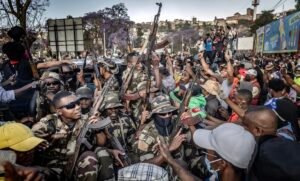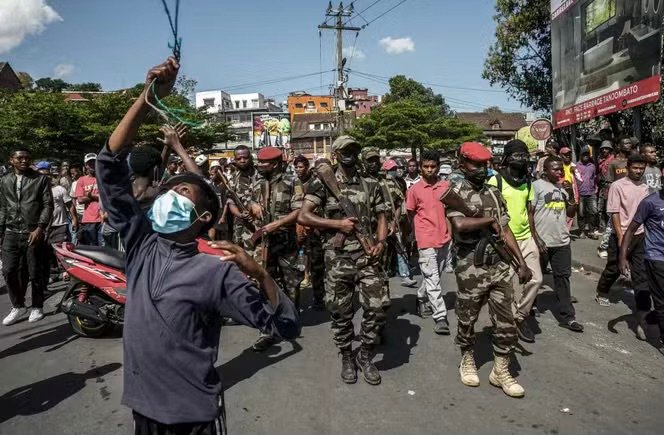Groups of Madagascar soldiers joined thousands of protesters in the capital, Antananarivo, on Saturday, after publicly declaring they would refuse orders to fire on demonstrators, AFP reporters confirmed.
The youth-led protests, which began on September 25, drew one of the largest crowds yet, fueled by public anger over power and water shortages that has since evolved into a broader anti-government movement.
After police attempted to disperse demonstrators with stun grenades and tear gas, soldiers arrived near Lake Anosy, where they were met with loud cheers and chants of “Thank you!” Some soldiers were seen waving the Madagascar national flag.
Earlier in the day, soldiers stationed at a Soanierana district barracks released a video pledging solidarity with protesters, stating:
“Let us join forces — military, gendarmes, and police — and refuse to be paid to shoot our friends, our brothers, and our sisters.”
They urged fellow troops to block aircraft from taking off and disobey orders to open fire on civilians or colleagues.
The extent of the soldiers’ defection remains unclear, but their participation marks a significant escalation in the unrest. The same Soanierana base led a 2009 mutiny that helped bring current President Andry Rajoelina to power.
In a press briefing, Armed Forces Minister General Deramasinjaka Manantsoa Rakotoarivelo appealed for calm, saying,
“We call on our brothers who disagree with us to prioritise dialogue. The Malagasy army remains a mediator and the nation’s last line of defence.”
 Tensions have risen sharply following a violent crackdown on Thursday, during which several protesters were injured as security forces used tear gas, rubber bullets, and armoured vehicles. The United Nations condemned the violence, urging authorities to uphold the rights to peaceful assembly and free expression.
Tensions have risen sharply following a violent crackdown on Thursday, during which several protesters were injured as security forces used tear gas, rubber bullets, and armoured vehicles. The United Nations condemned the violence, urging authorities to uphold the rights to peaceful assembly and free expression.
The UN reported that at least 22 people were killed in the early days of the protests, though President Rajoelina disputed the figure, claiming only 12 confirmed deaths, whom he described as “looters and vandals.”
Rajoelina, who initially sought to calm tensions by dissolving his government, has since adopted a hardline stance, appointing a military prime minister and filling key cabinet positions with security officials.
Among the world’s poorest nations, Madagascar has experienced repeated cycles of political unrest since independence in 1960. The current crisis threatens to reignite the instability that has defined much of its recent history.
Source:Africa Publicity








